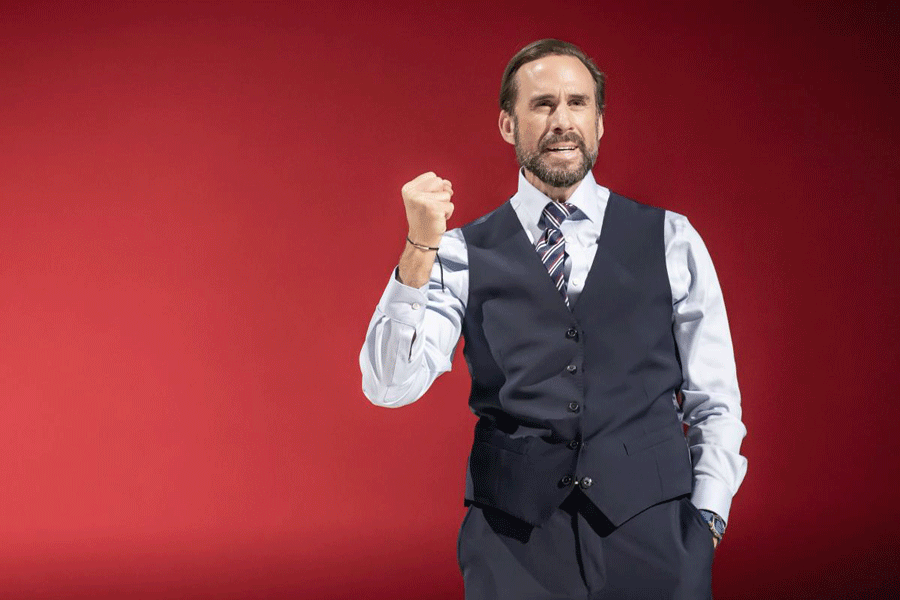The most sought-after play in London at the moment is Dear England, a drama about football that seeks to explore why the national team keeps fluffing penalty shootouts.
It has been written by James Graham and directed by Rupert Goold — with the well-known actor Joseph Fiennes cast in the lead role of the England football manager, Gareth Southgate.
The play has had rave reviews.
WhatsOnStage called it “the beautiful game in a beautiful play”; the Evening Standard said that “James Graham scores again with this thrilling football drama”; it was “Pitch-perfect Gareth Southgate brings the game home” in The Times; and “State-of-the-nation playwright James Graham brilliantly captures the blokey awkwardness within our wider national story” in the Daily Telegraph.
I watched the riotous play at the National Theatre on the South Bank and found the three hours slipped by without my noticing.
It so happens there are currently thousands of Indian holidaymakers in London, many of whom will be trying to catch the best plays in town.
Watching Dear England might make them wonder if there could be a similar play on why the Indian cricket team invariably chokes at finals, as happened during the recent World Test championship against Australia at The Oval. Of course, any Indian who wrote such an “unpatriotic” play would almost certainly be trolled. And the hapless playwright would also probably face legal action for “hurting the sentiments” of the people.

Dear England, a drama about football that seeks to explore why the national team keeps fluffing penalty shootouts. Pictures by Marc Brenner
Southgate believes that England men’s failure to clinch a major cup since they won the World Cup under the late Bobby Moore in 1966 is connected less with what happens on the field than with psychological problems in the mind.
“The problem is not on the pitch — it’s here,” he says, tapping his head.
“I think we all have a problem with what it is to be England at the moment,” he adds pensively.
Could Indian cricketers, who do so well in the IPL, be facing a similar mental block?
Southgate recruits a psychologist, Pippa Grange (Gina McKee), as “head of people and team development” to help build inner resilience. She hands out notebooks to the players so that they can jot down their inner thoughts. When one of the old school on the coaching staff expresses scepticism at her appointment, she explains: “This is men, dealing, or not dealing, with fear.”
Fiennes, in trademark waistcoat and striped tie, is excellent as the understated Southgate, who shows Wayne Rooney (Gunnar Cauthery) the door on taking over in 2016. A new captain, Harry Kane (Will Close), is appointed. His very ineloquence — if there is such a word — is itself eloquent. In a team address he talks of “my goals…apart from scoring goals…”
Along with Sterling, Southgate’s young lions include now familiar figures: Jordan Pickford (Josh Barrow), Jordan Henderson (Will Fletcher), Bukayo Saka (Ebenezer Gyau), Marcus Rashford (Darrah Hand), Harry Maguire (Adam Hugill), Dele Alli (Lewis Shepherd) and Eric Dier (Ryan Whittle).
In the set designed by Es Devlin, the results are displayed cinematically on an illuminated ring with flashing red for missed penalties. It’s like being at an actual match. At a time when the nation is agonising over Brexit and the pandemic, characters who play former Prime Ministers Theresa May, Boris Johnson and Liz Truss also mess up when they take penalty kicks.
In the 2018 World Cup in Russia, the psychological barrier is breached when England beat Colombia 4-3 on penalties but lose 2-1 Croatia in the semi-final.
There is heartache in the final of the Uefa Euro 2020 at Wembley (delayed by a year because of Covid), when England lose to Italy 3-2 on penalties. Afterwards, England’s unsuccessful penalty takers (Marcus Rashford, Jadon Sancho and Bukayo Saka) were subjected to racial abuse on social media.
And in the 2022 World Cup in Qatar, England lost 2-1 to France in the quarter-finals.
Although ostensibly about football, Dear England examines other issues at a deeper level, such as the role of race in determining national identity.
At one point, Southgate puts the white and red flag of St George down on the ground and asks his young players what it means to them.
“Some people think I shouldn’t be wearing this shirt,” is the response from Raheem Sterling (played by Kel Matsena), who is among the black players grappling with racist fans and imperial history.
It’s a bit like a cricketer from a minority community in India getting it in the neck for not performing well against Pakistan.
The title of the play is taken from the open “Dear England” letter Southgate addressed to fans in the middle of the pandemic on June 8, 2021.
“When you think of the grand scheme of things, perhaps football doesn’t seem so important,” he said. “And what I want to speak about today is much bigger than football.”
“This idea that some players don’t know what it means to play for England — or don’t care — has become something of a false narrative.
“It’s their duty to continue to interact with the public on matters such as equality, inclusivity and racial injustice, while using the power of their voices to help put debates on the table, raise awareness and educate.
“However, there are things I will never understand.
“Why would you tag someone in on a conversation that is abusive?
“Why would you choose to insult somebody for something as ridiculous as the colour of their skin?”
Substitute religion for skin and the play could be transposed to other societies.
Southgate does say: “Of course, my players and I will be judged on winning matches.”
He is staying on as England manager until after the Uefa Euro 2024 as the elusive search for a trophy continues.











